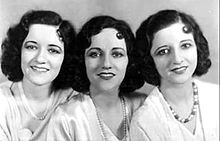Our website is made possible by displaying online advertisements to our visitors.
Please consider supporting us by disabling your ad blocker.
The Boswell Sisters
This article contains too many or overly lengthy quotations. (November 2021) |
The Boswell Sisters | |
|---|---|
 From left: "Vet", Connie and Martha in 1931 | |
| Background information | |
| Born | Martha Boswell: June 9, 1905 Connie Boswell: December 3, 1907 Helvetia Boswell: May 20, 1911 |
| Origin | New Orleans, United States |
| Died | Martha Boswell: July 2, 1958 (aged 53) Connie Boswell: October 11, 1976 (aged 68) Helvetia Boswell: November 12, 1988 (aged 77) |
| Genres | Vocal jazz |
| Years active | 1925–1936 |
| Labels | Victor, Okeh, Brunswick, Decca, Columbia |
| Past members | Martha Boswell Connie Boswell Helvetia Boswell |
| Website | bozzies |
The Boswell Sisters were an American close harmony singing trio of the jazz and swing eras, consisting of three sisters: Martha Boswell (June 9, 1905 – July 2, 1958), Connie Boswell (later spelled "Connee", December 3, 1907 – October 11, 1976), and Helvetia "Vet" Boswell (May 20, 1911 – November 12, 1988). Hailing from uptown New Orleans, the group blended intricate harmonies and song arrangements featuring effects such as scat, instrumental imitation, ‘Boswellese’ gibberish, tempo and meter changes, major/minor juxtaposition, key changes, and incorporation of sections from other songs.[1] They attained national prominence in the United States in the 1930s during the twilight of the Jazz Age and the onset of the Great Depression.[2]
After the trio split in 1936, Connie continued as a solo vocalist in radio, film, and later television for an additional quarter century.[2] The trio's "unique singing style and ground-breaking arrangements fused 'blackness' and 'whiteness' in music," and their collaborations with "the preeminent white swing musicians of their day—the Dorsey Brothers, Glenn Miller, Benny Goodman, Joe Venuti and Eddie Lang, Artie Shaw, Victor Young, Bunny Berigan—had a profound effect on the development of the big band sound in the 1930s."[2] [3] When assessing their legacy, scholars claim the Boswell Sisters "made 'real' jazz commercially viable, destigmatizing the music and opening its appreciation to the wider American public."[4][5][3]
- ^ Stras 2009, p. 312.
- ^ a b c Stras 2009, p. 297.
- ^ a b Von Schilling, James A. (2008). "Hearing the Boswell Sisters". Popular Music and Society. 31 (2): 191–200. doi:10.1080/03007760701859049. S2CID 219729136.
- ^ Stras 2009, p. 298.
- ^ Hassinger, Jean. Koskoff, Ellen (ed.). "Close Harmony: Early Styles in the Music of the New Orleans Boswell Sisters". Women and Music in Cross-Cultural Perspective. Urbana : University of Illinois Press, 1989: 195.
Previous Page Next Page


